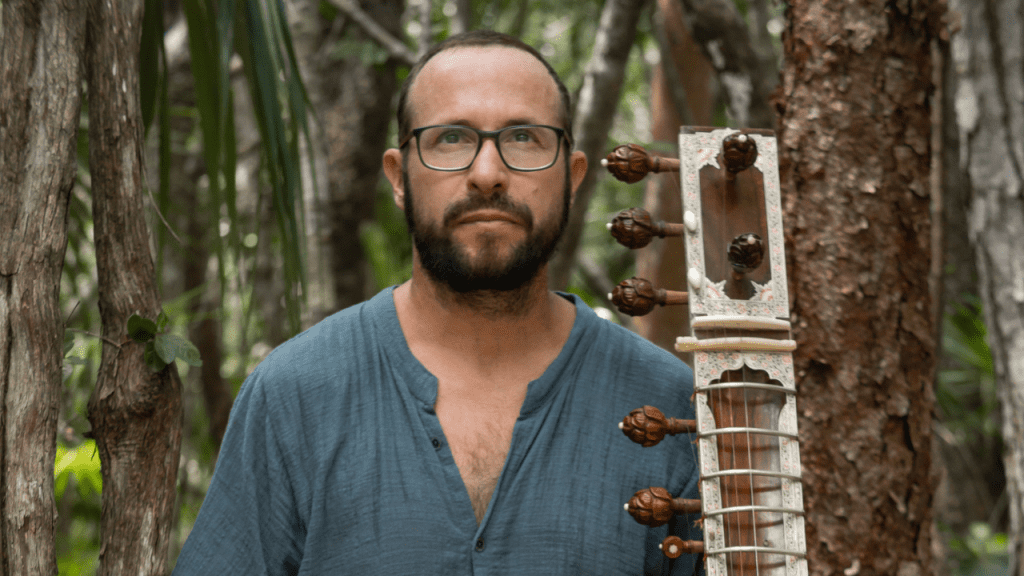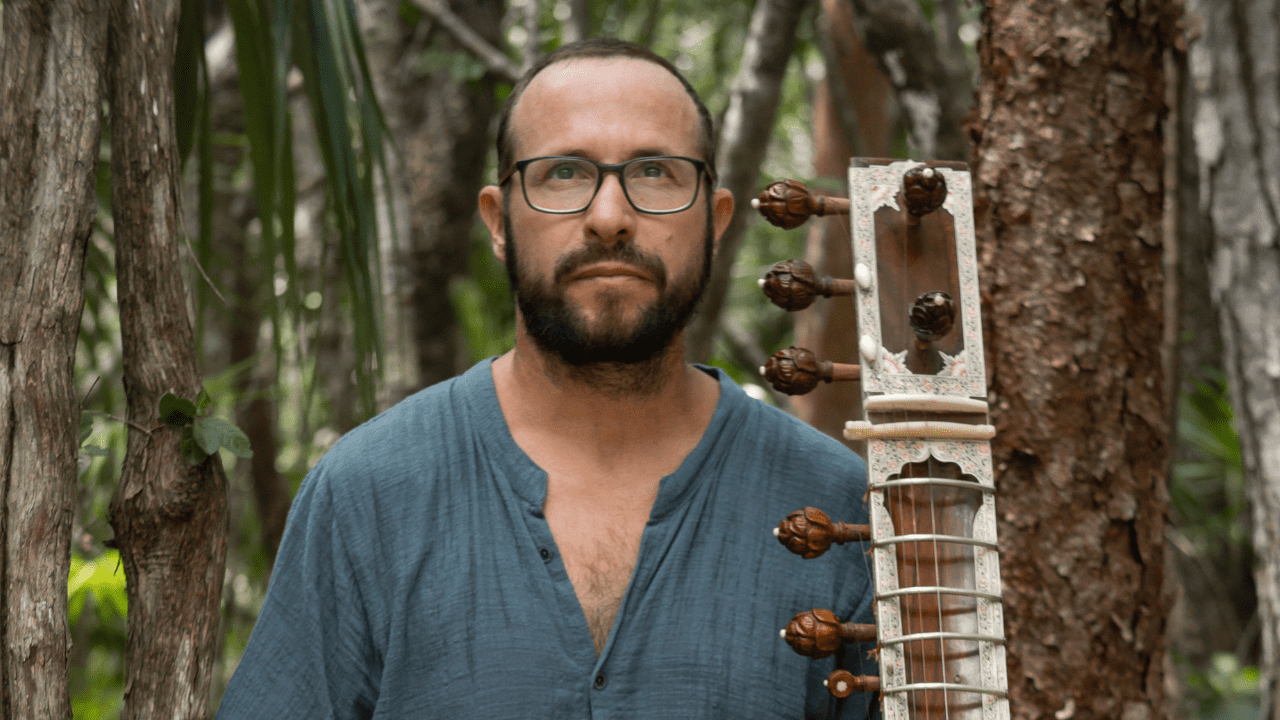

David Devanagari
Can You Introduce Yourself to Our Audience?
Hello, my name is David Devanagari. I am a composer and producer, originally from Spain and currently based in Ibiza. Music has always played a very important role in my family, and since my adolescence, I have felt that music is the driving force of my life.
My journey as an artist began after traveling extensively through Latin America, Asia, and Europe, experiences that deeply shaped my sonic vision. These journeys exposed me to a wide variety of sounds and cultures, inspiring me to start creating my own music in 2010.
I’ve always been drawn to blending traditional instruments, like the Indian sitar and the handpan, with electronic rhythms. This fusion allows me to transform my personal experiences, feelings, and dreams into immersive musical journeys. Over the years, my live sets and productions have become a way to share these stories with audiences around the world, connecting cultures and creating moments of reflection and enjoyment.
What Inspired You to Pursue a Career in Music, Specifically in Electronic Genres?
Music has always been my engine. I grew up playing in bands—even with one of my sisters I was part of a band—and I’ve always loved the magic that happens when people create together. Over the years, Devanagari has had different members and formats, and in the future, I’m excited to explore new ways of sharing music while keeping a deep connection with the audience.
What truly captivated me about electronic music is its total freedom. I don’t see it just as a genre; it’s another instrument—limitless, able to create sonic landscapes that breathe, move, and tell their own stories. It lets me experiment, break boundaries, and transform emotions into sounds, building worlds that once existed only in my imagination.
With a minimal setup, I can compose from anywhere, which is essential when traveling. Every production and live set becomes a creative lab where notes turn into feelings, melodies into experiences, and music into a direct bridge to the audience. Electronic music gave me a borderless language, where every sound can open a new universe.
How Would You Describe Your Style and Sound?
My style and sound transcend genres and labels. More than a style in itself, I aim to convey emotions and experiences; what matters most to me is generating a type of feeling that usually leans toward melancholy, as it has an interesting blend of sadness and joy. My choices of tones, colors, and textures are designed to evoke that specific impression.
The inclusion of live instruments gives the music a connection to world music or downtempo, but if you listen to my recordings from 2011 until today, you’ll notice that my approach has been varied and at times more experimental, far from predefined styles. Despite the differences between my earlier productions and the current ones, there is always an emotional thread that connects them. This continuity of feelings, more than any label, defines my music. The freedom to explore and let emotions guide the creative process is what characterizes Devanagari.
About Your Release
Tell Us About Your Latest Release
Bósforo was born from one of my trips to Turkey, specifically Istanbul, a city that captivated me from the very first moment. I spent several days exploring its streets, getting lost among its bazaars, markets, and urban sounds, and the more I discovered it, the more fascinated I became by its essence.
Istanbul has always functioned as a bridge between worlds: between Europe and Asia, between cultures and historical eras, and this can be felt in every corner, every interaction, and in the music that floats through its streets.
The city inspired me to capture that sense of fluidity and multiculturalism in Bósforo. I wanted to reflect how Istanbul maintains a very clear identity while opening itself to the world, how it can be a crossroads without losing its own voice. Every sound, every texture in this production aims to convey that duality: the strength of what is unique alongside the richness of diversity. It’s a simple and fun track, dynamic and fresh, which I’ve been playing in some of my live shows and has always been very well received by the audience.
What Message or Feeling Do You Want Listeners to Take Away?
With Bósforo, I want to convey fun and freshness, that sense of constant movement and freedom that comes from traveling and discovering new places. It’s a light and dynamic track, easy to connect with and to dance to, combining vocal phrasing that goes straight to the heart with some sampled traditional instruments and sections of super psychedelic, wild synthesizers.
I think this blend is perfectly balanced, and it’s exactly what has made the track so successful. When listening, I hope people feel joy, energy, and excitement, fully enjoying every moment of the music.
Can You Walk Us Through the Creative Process Behind This Project?
The idea for Bósforo came while visiting Hagia Sophia. I spent long periods of time there, as it captivated me with its perseverance through time and its rich history across the centuries.
My creative process always follows a similar pattern: what I enjoy the most is performing live, and I always start by incorporating the songs into my concerts, even if they are early versions that sometimes differ quite a bit from the final version.
I usually make a very basic version to see how it works within my show, since my concert is a story in itself and I want to observe how the song connects with the audience. Then I let it rest for a while, and later I revisit it to finalize it and give it the proper format for a release. This method—having the idea, presenting it live, letting it rest, and then completing it—is a process I frequently use in my work.
How Does This Release Differ From Your Previous Work?
I used to prefer songs that included acoustic instruments, like sitar or handpan, because those were the ones I enjoyed playing live the most, as the power of these instruments feels very different from electronic ones.
For example, my previous release with Café de Anatolia, Ixchel, was born from the handpan, giving it a very organic and intimate character. However, over time this has changed, and that evolution has enriched my productions, making even those that don’t include sitar or handpan more interesting and enjoyable for me.
In Bósforo, I love how the synthesizer section sounds live; I really enjoy playing with the delays and how that part goes completely wild. Also, the central section, with a more staccato rhythm, fascinates me in how it sounds. I hadn’t really explored those kinds of rhythms or those effects and psychedelics in my songs before. Bósforo is one of those tracks I’m really happy with, as it’s very complete, fun, and I truly enjoy performing it live.
Industry and Personal Insights
What Do You Think Is the Biggest Challenge for Artists in the Electronic Music Industry Today?
I believe one of the biggest challenges for artists in the electronic music industry today is not falling into the traps of social media immediacy. Often, people chase quick virality or instant formulaic success, which can make the essence of the creative process get lost.
Constantly following what the algorithm rewards or chasing trends often creates a “copy and paste” effect that usually adds quantity but not quality. For me, the important—and at the same time challenging—thing is to enjoy the journey, stay consistent, and remain true to your musical identity, never forgetting the original intention behind creating music.
That “all or nothing” feeling from one day to the next is changing the way music is made and how we understand our craft, and learning to resist it is a key challenge for any artist.
What Role Do Events, Collaborations, or Labels Play in Shaping Your Career? (Please Mention Café De Anatolia)
For me, live shows are essential because live music has something that can’t be replicated: every note, every rhythm feels different depending on the energy of the venue and the people in that moment. It’s a unique instant, a “here and now” that creates a direct and authentic connection, making each show a completely different and exciting experience.
With Café de Anatolia, I feel that their role goes far beyond simple promotion. I love how they care for every release, putting attention and affection into every detail, and how they add real value to my music that I can feel even in my day-to-day life.
When you start composing, there are always doubts: you never know how far an idea will go, if it will work, or if it will move anyone. Having a team behind you that trusts your work, that genuinely believes in what you do, gives you security and motivation to keep exploring new sounds, rhythms, and textures without fear.
I also really enjoy the sense of collaboration that comes with it: it’s not just a professional relationship, but something closer to friendship, where ideas, trust, and energy are shared. Knowing there’s real support and mutual trust allows me to take risks, experiment with different combinations, and continue developing my musical identity freely.
That connection with a team that understands and values your vision turns every release into an enriching experience and gives me the certainty that I can keep creating with passion and peace of mind.
Do You Have Any Advice for Aspiring Artists Looking to Break Into the Scene?
Be authentic and never forget what drives you to make music. Trust the process, take your time, and don’t fall into the trap of chasing instant success; real success comes from keeping at it no matter what, not from a certain number of followers or streams.
Always strive to be as genuine as possible, because there are many people out there looking for real, meaningful connections rather than superficial ones.
Also, dedicate time to studying and learning, seek collaborations, and get guidance in areas where you’re less confident—building bridges with other artists opens new perspectives, sparks creativity, and helps you grow as a musician.
Looking Ahead
What Can Your Fans Expect Next?
I have several new things coming up, and I’m in the middle of redefining my live show. I’m working on collaborations, both with other artists and sound engineers, to take the live experience to the next level.
One highlight is the upcoming release of Bósforo, which I’m really excited about—it’s a track that feels complete, fun, and amazing to perform live.
There are also two other tracks I’m going to release independently, which is an exciting challenge for me, because I love experiencing the entire process: from the birth of the song idea, to composing it, performing it live, and finally sharing it with the world so anyone, anywhere, can hear it.
I’m really thrilled about everything that’s coming, so stay tuned, because we’re going to keep expanding the project in different directions.
David Devanagari – “Bósforo” – Out on September 5

